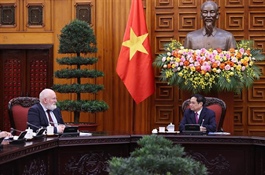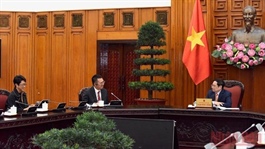VN to build a modern and sustainable agriculture economy by 2030
VN to build a modern and sustainable agriculture economy by 2030
Viet Nam has set an objective to build a modern and sustainable agriculture economy during the 2021-2030 period, said minister of agriculture and rural development Le Minh Hoan at a conference in Ha Noi yesterday.

In order to realise such objectives, the minister said the country's agriculture sector must foster an advanced economy with an emphasis on producing high-quality products and added value that meet the demands of the market.
Another top priority is to build the country's rural areas and improve living standards for farmers. The minister highlighted the need for the development of agricultural infrastructure and investment in human resources that benefit Vietnamese farmers.
According to the ministry, Viet Nam's agriculture sector aims for a growth target of 2.5-3.0 per cent annually until 2030 with agricultural productivity at 5.5 per cent. Measures have been taken to explore potential markets for Vietnamese products, which was said to increase in value at 5-6 per cent a year.
Hoan said the objective is to transform Viet Nam's rural areas into modern, developed agricultural production centres that employ advanced and environmental-friendly technology by 2050.
The ministry's top priority is the adoption of green technologies with a focus on preserving and protecting natural resources as well as the human habitat. The country is to continue with its restructuring efforts of the agriculture sector in the near future with a focus on developing local products with strong competitive advantages and stronger collaboration among localities and production centres across the country.
Meanwhile, there is a need to conduct a comprehensive review of the country's current land-use regulations, said Tran Cong Thang, head of the Institute for Policy and Strategy for Agriculture and Rural Development.
He advised policymakers to come up with more flexible and effective policies to encourage businesses to invest in agriculture and land-enrichment activities, especially in remote and isolated regions in desperate need of infrastructure.






















